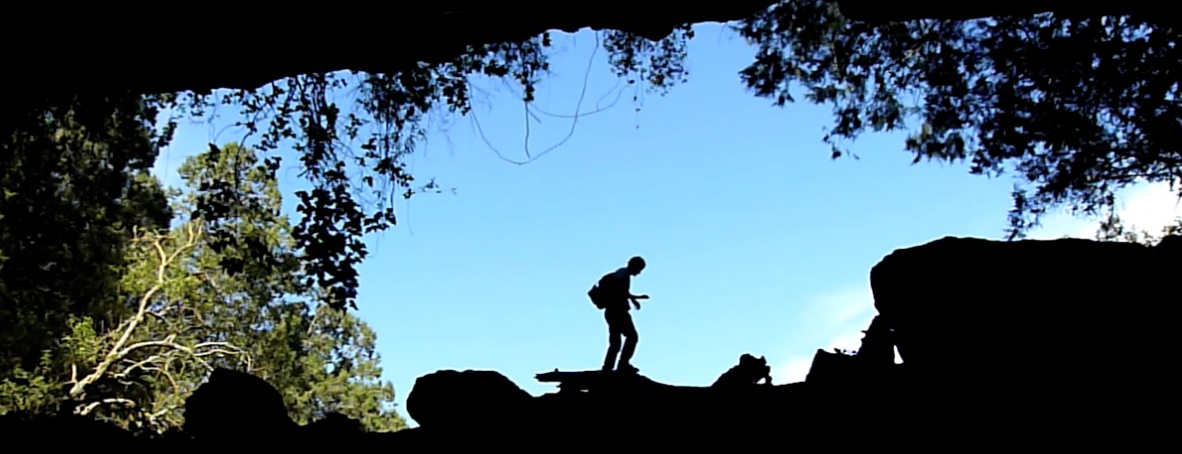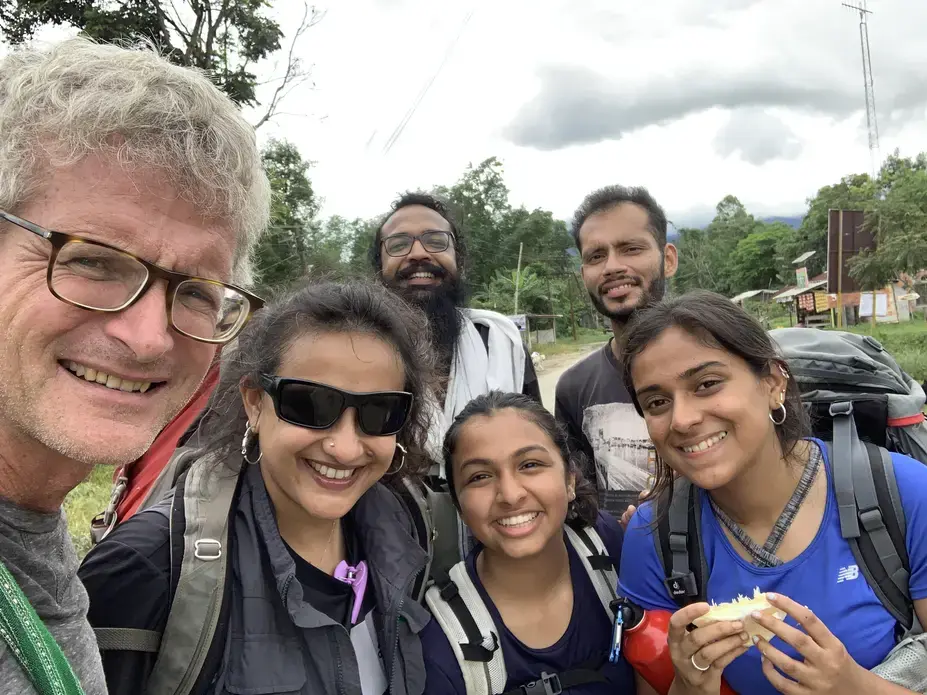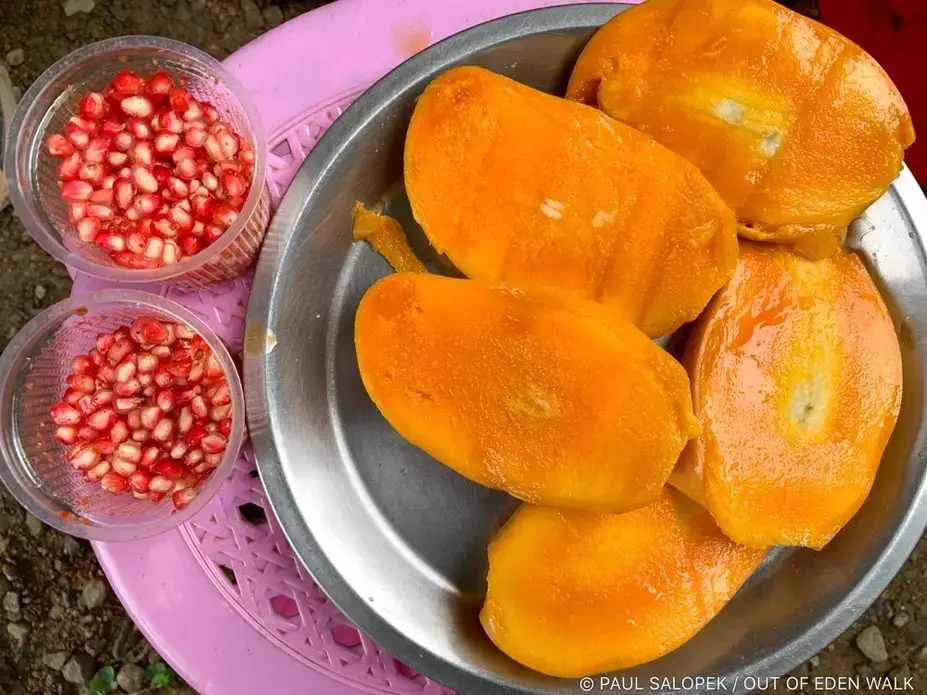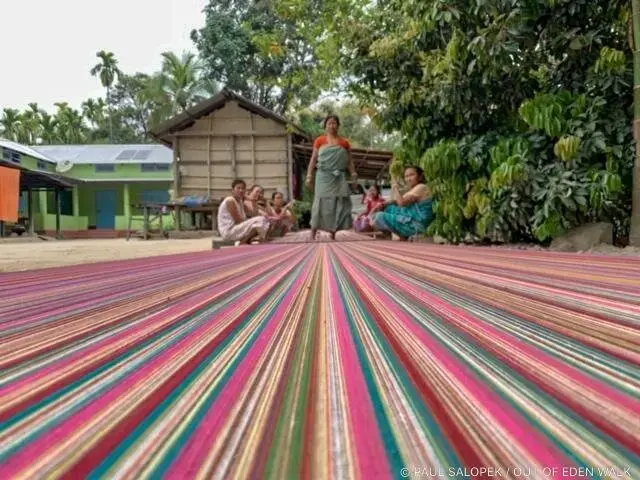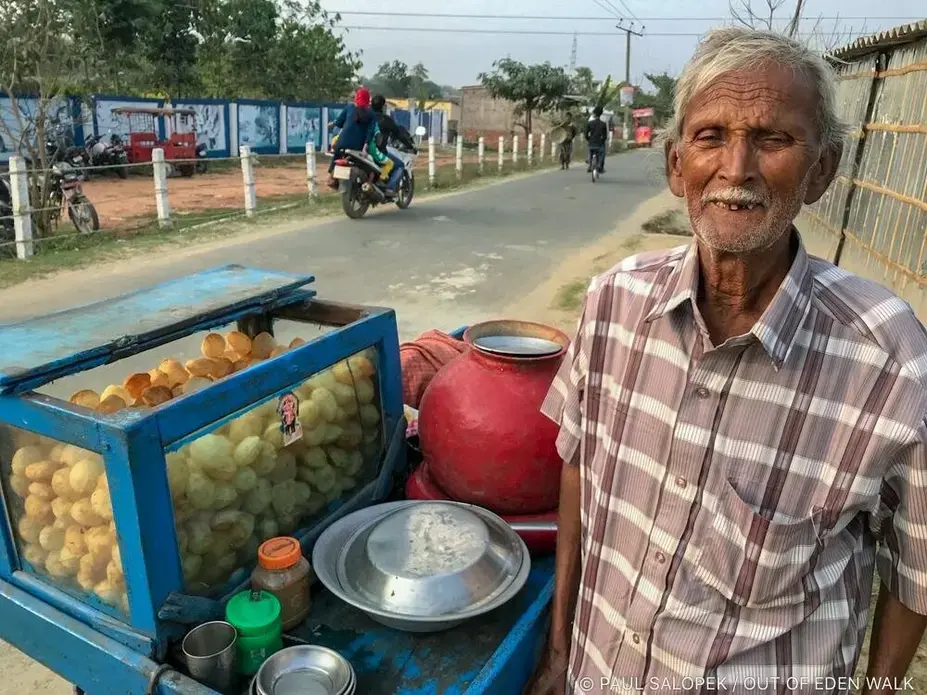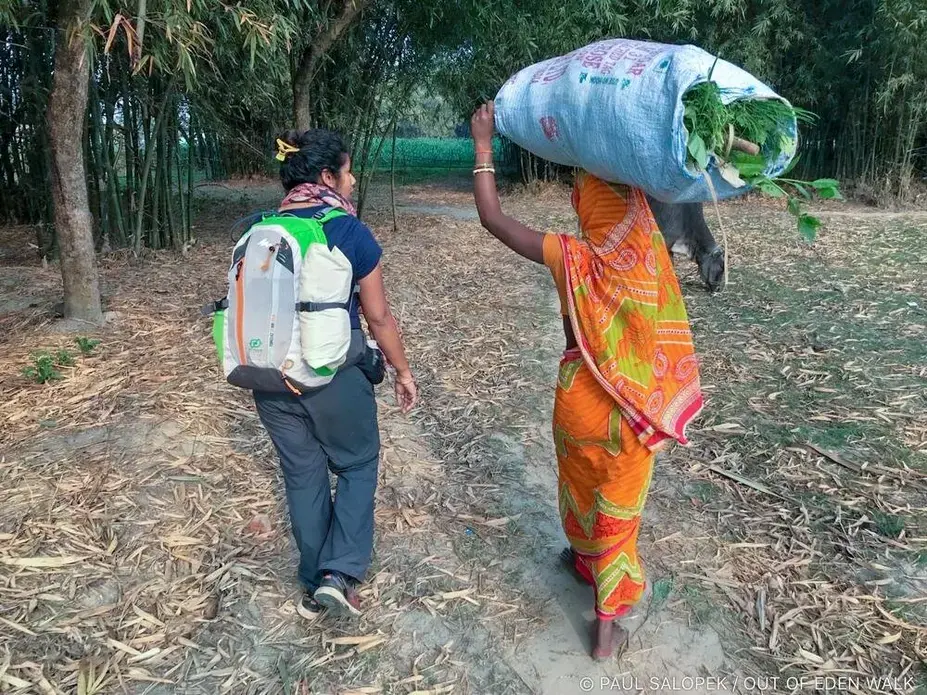I first wrote about Paul Salopek—a journalist and National Geographic Explorer—seven years ago when he started his journey around the world—by foot. Since that time he has walked 9,000 miles and arrived in northern Myanmar. I recently interviewed Paul for an article in KidsPost. What follows here is a record of that interview—in-depth answers to my questions on girls' education, climate youth activists, foods, families, and the practice of slow journalism.
The Pulitzer Center is an education partner of Paul's Out of Eden Walk. You will find more information here.
Seven years ago, you began your journey in Ethiopia. Your goal? To walk around the world in seven years. But the journey has taken far longer than you expected. What has accounted for that? What has been the biggest obstacle and what has come as the biggest surprise?
The original guess was just a rough equation scratched out with pencil on paper. I supposed that, if I walked 25 kilometers a day, or about 15 miles, and if I spent half my days walking and the other half of my time and stopping to report, it would take me about seven years to cover my 33,000-kilometer, or 21,000-mile,route from the Horn of Africa to the tip of South America.
As everyone knows, despite what social media platforms think, life can't be boiled down to numbers. Life is far messier than that, and this is a very good thing, as far as I'm concerned. Predictability kills creativity, including storytelling, which is what this project is really about. So I'm behind schedule for pretty good reasons.
First, the world is way too interesting a place to pass through without pausing often, to listen and to learn. So I stop a lot more than I first imagined. I talk to dozen or more people in an average day. Sometimes, I think that even walking is too fast a pace to really understand a story or a place. I tell students who are following along online—and there are tens of thousands ofthem, thanks to my education partners at National Geographic, the Pulitzer Center and Project Zero at Harvard—I tell them that walking cross the world is like being enrolled in a continuing education course that goes on forever, but where the subject matter changes every single day, from climate change to the history of headhunting to how to heal a donkey's saddle sore. Recently, I learned about sand-mining mafias—who knew?—and how to treat leech bites with a flower. It's never boring. Even the obstacles that have slowed me down—and they've mainly been closed political borders, or the inability to secure visas—ended up being fruitful in surprising ways. When I couldn't get permission to walk through Iran, for example, and had to slog around it, and discovered the Caucasus, one of the great historical crossroads of the world and the birthplace of wine making. Paused to wait for winter snows to melt in Central Asia, I studied Russian. Нелегко! For a guy like me, of limited capabilities, this journey has been very kind. A gift.
All along the way you have been practicing "slow journalism"—taking your time to see, listen, and experience new things. You're also tasting different foods in every country you visit. What are a couple of the most interesting dishes?
What do you mean by interesting? There've been cuisines that I may not be used to, like eating mutton three times a day, in Central Asia. But you always adapt. And there've been novelties like the vegetarian dishes of the Naga people of northeast India, which consist of a lot of wild rainforest plants—including plucking a plate-sized leaf from a tree and munching on it like a giant hank of lettuce. I think I've eaten more healthily during the past nearly seven years of the walk than in my whole life. I've been moving mostly through rural areas, so I'm eating a lot of fresh produce, milk products, occasionally meat. It's only when I transit cities that I step back into the global diet of processed foods.
What food have you missed the most?
Nothing. Not even donuts. And don't let my many walking partners tell you otherwise.
Slowing down can help us better understand and appreciate the world around us. Still, there must have been times when you wished you could walk faster (or not walk at all and take a speedboat or motorbike)? Could you describe one? (Perhaps you were uncomfortable or felt you were in danger.)
This is an interesting question.
Let me be clear. Once I'm temporarily paused somewhere along the global trail, say, stopped to write for a week in a city, I do take local buses or rickshaws to shop for food, or visit a dentist, or whatever. All forward movement on the journey though—and this is the overwhelming experience—is walked.
Were there times crossing the Thar desert of India, for instance, when the temperatures were broiling, that I wished I was in a car instead? Honest answer? As strange as it seems, no. Never.
Something new, a shift of perspective, has happened in my mind over the past years while crossing landscapes on foot, horizon to horizon, day after day, season after season. There's been a scaling of the surrounding space to my body, to my stride, so that taking the time to reach someplace that's a six-hour walk away seems utterly normal—as opposed to compressing that same journey to half an hour in a car. "Car time"—and what cars have done to our brains—is what seems weird to me now.There's an apt comparison here between cars and the Internet. It is like the difference between experiencing a new landscape, or a new story, or life itself, with your whole body—a living, breathing experience, the touch of it, the taste of it—as opposed to through a private bubble, a cocoon, of glass and metal. A car windshield and an iPhone screen aren't all that different.
I'll share a secret about transcontinental walking.
Anywhere in the world, when I bump shoulders with people hustling along city sidewalks, or when I see them zipping past in vehicles, and I look at their faces, I see eyes that are oftenfocused inward. These people are involved in an act of transportation—going from A to B. But they're not really engaged in movement. It's as if they're wearing blinders. This happens to everyone, myself included. But long distance walking tends strip away that sort of tunnel vision. It wakes you up. You can't sleepwalk your way through the world. You have to be switched on at sorts of levels. And this gives me theawareness that at any instant, I can walk away from any spot on earth, and things will probably be okay. There's a specialconfidence, a fragile kind of power, that comes with thiswalking state of awareness. At this stage, I wouldn't trade it away for any car ride, no matter how convenient.
Tell us about one or more of the families you've met. How are they like American families? How are they different?
Tolstoy wrote that all happy families are alike in their happiness, while all unhappy families are unhappy in their own unique way.
I'll generalize further. Happy or unhappy, most families are alike. It doesn't matter whether they are in a yurt in Kazakhstan or a glass skyscraper in Israel. Maybe the size is the only difference. North Americans tend to have small families. I've stayed in homes in places like Turkey or India where there are many generations under one roof—kids, parents, grandparents, even uncles and aunts. So there's often a lot of bustle, a lot of busy activity. Privacy in these situations is a flexible concept. Sharing a bed with hosts of the same gender is pretty common, simply because there's no other space. This is very human.
In some cultures the gender divides are quite large. I stayed with middle class households in Saudi Arabia, and with shepherds in Jordan, for example, where I rarely if ever saw the women members of the family. They were behind walls or curtains doing work that I couldn't see, like food preparation. The men would even carry the dishes into a commons room.
You must have taken part in many holidays or celebrations that are new to you. Which one was most fun? Or most intriguing?
I spent Ramadan in the Saudi city of Yanbu, and seeing an entire urban center switch to a nocturnal schedule—everyone broke their fast after sunset, and stayed up late, and even the street workers worked at night—was interesting. I celebrated Nawruz, an ancient fire-worshipping spring festival, among the descendants of nomads on the steppes of Kazakhstan. And in India is was an ear-splitting blast to participate in the Durga Puja madness of street dancing and firecrackers in Kolkata. Christmas Eve of 2013 caught in a storm-buffeted Bedouin shepherds' tent in the mountains of Jordan—not far from the original event, across the Dead Sea, in Bethlehem.
Is it true that everywhere you go people like to tell jokes? Can you share a good joke you heard or one that was played on you?
Well, certain people tell jokes. I think I've probably been the butt of thousands of untranslated ones. And that's fine. Hilarity is part of familiarity. Humor is tough across cultures, as everyone knows. My first name sounds like the word "urine" in Arabic. My walking partner in Saudi, Mohamad Banounah, just started to call me "Mustafa," to preempt the inevitable giggles. Itold him I've been called much worse. Right now I'm trying to think of a local joke that I've heard that's actually clean enough to be printed in a family newspaper. Let me ponder this . . .
And a wise saying? People from many different backgrounds and cultures like to pass on wise sayings or proverbs. What is your favorite from this journey?
'Truth can walk through the world unarmed."
That's Bedu. I'm not sure it's true.
We hear that girls in many countries do not receive the same education as boys. What has your experience been? Do girls study the same subjects as boys?
Girls often don't receive the same education opportunities as boys in many places of the world that I've walked. This was visible especially in conservative agricultural economies. Everyone knows this is a huge loss to the societies involved. There are always remarkable exceptions, of course. I met parents along my route who were going against the grain, and valuing their daughter's educations, and that was refreshing. The Ismailis, a minority branch of Shia Muslims, have a saying: If parents are so poor they must choose between educating a son or daughter, then send the girl to school first. They are a prosperous and relatively egalitarian community.
In general, though, the single biggest and most inescapable social injustice I have encountered on foot across the world—walking through dozens of different cultures, ethnicities, languages, religions—is gender. At the dawn of 21st century, women tend to get the short end of the stick from birth to death, no matter where they are. They're the first ones up to work, and the last to go to bed after a long day of labor. They get paid less. Their voices generally don't carry as much weight in political forums. Even their freedom of movement is curtailed by men—where they can go, and when. It's really extraordinary, when you stop and think about it. If aliens landed on Earth today, they would be baffled by it: half the human species being discriminated against based on two X chromosomes. It's stupid and maddening. We all suffer for it.
Several pack animals have carried many of your supplies and been your companions on this journey. How have you seen animals treated?
I can't really single out one particular country for how animals may be treated differently. It's more a question of different economies, not different nations.
In rural economies—and that's been the bulk of my experience so far, walking in farmlands, in the open steppes of Central Asia, in the vast deserts of the Middle East, in the cosmos of villages of India—people treat animals as partners in work, in survival, and not as pets, as city people tend to do. I go back and forth on this. I see the powerful bonds of intimacy that more affluent segments of the human family develop with their pets. I see the goodness that comes of that almost familial closeness, for humans and animals both. But I also respect the more practical relationships that farmers and herders often maintain for their domesticated fellow creatures. In some ways, the farmers' relationships are even deeper, less sentimental, and maybe truer. Rural people tend to allow animals to be themselves—animals—and the bonds between species in many ways are just as strong for it. I was raised in a village environment, in Mexico, so I'm likely biased.
All around the world young people are sounding an alarm—warning us of the climate emergency. What role are the young people you've met playing?
I've seen the effects of climate change from the first step of my journey back in 2013. I've seen fickle rains in the Horn of Africa cause violence between herders who are competing for scarce grass and water for their goats and camels. I've seen record rains in Kazakhstan make the steppes there impassable to travel for the first time in memory. I watched farmers in Afghanistan reap the benefits of massive glacial melts—they were planting more crops and orchards than ever before—while knowing, in their hearts, that it was all a temporary water bonanza. They realized that the glaciers were vanishing, and so the water would eventually dry up, too, making life even worse than ever before. The strange thing is that older people can see this, because they've been alive long enough to register the changes. But it's mainly young people who are demanding action. That generational divide speaks to human selfishness. Adults have to start acting like true adults.
Any thoughts you'd like to leave with us?
Join me. Follow the walk's storytelling. Join the walk's online education platforms. Let' have a conversation. And do get out and walk a bit on your own, to better understand your community. After all, whether we like it or not, we're all walking together into a challenging new century. We might as well swap notes, compare compass bearings, maps.


